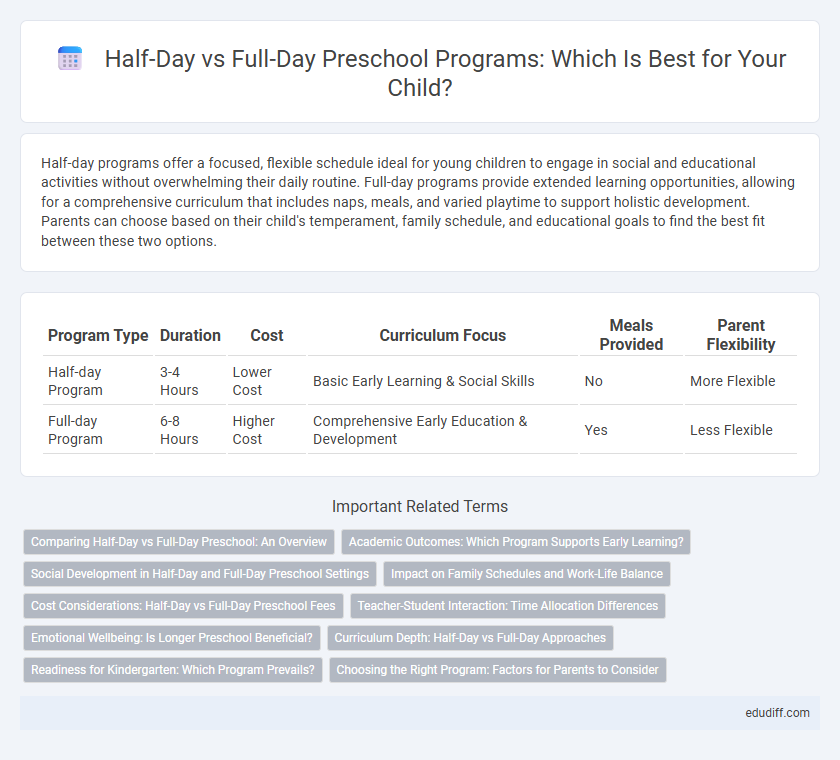Half-day programs offer a focused, flexible schedule ideal for young children to engage in social and educational activities without overwhelming their daily routine. Full-day programs provide extended learning opportunities, allowing for a comprehensive curriculum that includes naps, meals, and varied playtime to support holistic development. Parents can choose based on their child's temperament, family schedule, and educational goals to find the best fit between these two options.
Table of Comparison
| Program Type | Duration | Cost | Curriculum Focus | Meals Provided | Parent Flexibility |
|---|---|---|---|---|---|
| Half-day Program | 3-4 Hours | Lower Cost | Basic Early Learning & Social Skills | No | More Flexible |
| Full-day Program | 6-8 Hours | Higher Cost | Comprehensive Early Education & Development | Yes | Less Flexible |
Comparing Half-Day vs Full-Day Preschool: An Overview
Half-day preschool programs typically run for 3 to 4 hours, focusing on foundational skills like socialization, basic literacy, and motor development, while full-day programs extend to 6 to 8 hours, offering a more comprehensive curriculum including structured play, meals, and rest periods. Parents often choose half-day programs for flexibility or part-time care, whereas full-day programs cater to working families seeking extended childcare and enrichment activities. Research indicates that full-day attendance can promote better academic and social outcomes, though quality and curriculum play crucial roles in preschool effectiveness regardless of program length.
Academic Outcomes: Which Program Supports Early Learning?
Half-day preschool programs provide a focused, less overwhelming environment that supports foundational skills such as language development and social interaction, crucial for early learning. Full-day programs offer extended learning time with opportunities for comprehensive activities, including cognitive, motor, and emotional development, enhancing academic outcomes over time. Research indicates that full-day attendance generally results in higher literacy and numeracy skills by kindergarten entry, promoting stronger readiness for formal schooling.
Social Development in Half-Day and Full-Day Preschool Settings
Half-day preschool programs emphasize social development by providing structured interaction in shorter, focused sessions that foster peer communication and cooperative play. Full-day preschool settings offer extended social exposure, promoting deeper relationship building, conflict resolution, and emotional regulation through varied activities throughout the day. Research indicates that both program types support social skill growth, but full-day attendance correlates with enhanced social competence due to prolonged peer engagement and adult scaffolding.
Impact on Family Schedules and Work-Life Balance
Half-day preschool programs offer flexible morning or afternoon sessions that allow parents to maintain more control over daily routines, easing drop-off and pick-up logistics while supporting part-time work or home responsibilities. Full-day programs provide extended childcare that can better accommodate full-time work schedules, reducing the need for additional caregiving arrangements and promoting consistency throughout the day. Families often weigh the trade-offs between these options based on their specific work commitments, desired child engagement time, and overall impact on household time management.
Cost Considerations: Half-Day vs Full-Day Preschool Fees
Half-day preschool programs typically cost between $5,000 and $9,000 annually, offering budget-friendly options for families seeking essential early education. Full-day programs, averaging $10,000 to $15,000 per year, provide extended care and enrichment activities but require a higher financial commitment. Families should evaluate cost differences alongside the benefits of additional instructional time and care availability when choosing between half-day and full-day preschool options.
Teacher-Student Interaction: Time Allocation Differences
Half-day preschool programs typically allocate 3 to 4 hours daily for teacher-student interaction, allowing focused, intensive engagement in a shorter timeframe. Full-day programs extend this interaction to 6 to 8 hours, offering prolonged opportunities for personalized attention, social skill development, and diverse learning activities. The increased time in full-day programs supports deeper teacher observation and tailored responses to individual developmental needs.
Emotional Wellbeing: Is Longer Preschool Beneficial?
Full-day preschool programs offer extended social interaction, promoting emotional resilience and self-regulation skills essential for early childhood development. Half-day programs provide concentrated learning environments, which can reduce overstimulation and support emotional security for some children. Research indicates that the benefits of longer preschool hours largely depend on individual temperament and family dynamics rather than program duration alone.
Curriculum Depth: Half-Day vs Full-Day Approaches
Half-day preschool programs concentrate on core developmental skills such as basic literacy, numeracy, and social interaction within a limited timeframe, resulting in a more focused but less comprehensive curriculum. Full-day programs offer an extended schedule that allows for a broader curriculum, incorporating varied activities including arts, physical education, and exploratory learning to foster deeper cognitive and emotional development. The increased duration in full-day settings enables educators to implement a more holistic and enriched learning experience, aligning with early childhood education standards.
Readiness for Kindergarten: Which Program Prevails?
Half-day preschool programs provide foundational skills in socialization and basic literacy, yet full-day programs significantly enhance school readiness by offering extended opportunities for cognitive development, language acquisition, and structured learning activities. Research indicates children in full-day programs demonstrate greater proficiency in early math and reading skills, alongside improved attention spans and behavioral regulation compared to peers in half-day settings. Consequently, full-day preschool aligns more closely with kindergarten readiness benchmarks established by educational standards organizations.
Choosing the Right Program: Factors for Parents to Consider
Parents choosing between half-day and full-day preschool programs should consider their child's temperament, social needs, and family schedule to ensure the best fit. Half-day programs often provide a balanced introduction to the classroom environment, ideal for younger children or those new to social settings, while full-day programs offer extended learning opportunities and consistent routines beneficial for early development. Evaluating factors such as curriculum intensity, childcare needs, and financial cost helps parents make an informed decision that supports their child's growth and family dynamics.
Half-day program vs Full-day program Infographic

 edudiff.com
edudiff.com